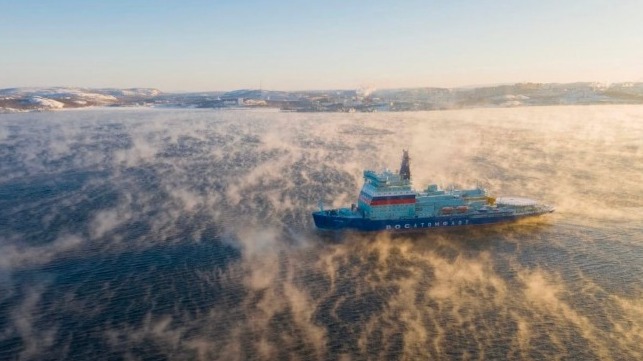Rosatom Seeks Putin’s Approval for Northern Sea Route Plan

Russian President Vladimir Putin has been urged to approve the ambitious Northern Sea Transport Corridor project in order to open up the Northern Sea Route, which is attracting interest from the international business community.
Rosatom Director General Alexey Likhachev told Putin in a meeting at the Kremlin Wednesday that the containerized shipping industry is increasingly expressing interest in the Northern Sea Route following the events in the Suez Canal and growth in world trade.
“We would like, with your consent, to start developing a large container transport logistics corridor on the basis of our Northern Sea Route project,” said Likhachev.
He added that developing the route for the commercial shipping industry will open a completely new level of business and economic positioning, not only for the state corporation but also for Russia, with the wider objective being to benefit the world economy.
The project involves the development of two terminal hubs, a fleet of icebreakers, port infrastructure, communication and navigation systems, among other investments.
According to Likhachev, Rosatom is implementing projects designed to open the route to commercial shipping with focus being on conducting additional analysis on the needs for icebreaking support for medium and long term operations.
The company reckons it might need three to six new powerful icebreakers to keep the entire Northern Sea Route open for daily shipments throughout the year. It has embarked on plans to build the first batch of icebreakers powered by liquified natural gas (LNG).
“All projects on the Northern Sea Route are developing, perhaps even at a higher pace than we planned. In this regard, we are conducting an additional analysis of the needs for icebreaking support after 2024, after 2030,” said Likhachev.
The Northern Sea Route is emerging as a strategic economic front for Russia as countries and shipping lines seek to find alternative routes to Asia and Europe. Disruptions like the blockage of the Suez Canal in March and continued COVID-19 disruptions in ports have weighed on an otherwise booming ocean freight industry, which is enjoying unprecedented demand and profitability.
Rusatom Cargo, a subsidiary of Rosatom, contends that transit cargo flow along the Northern Sea Route could reach 80 million tons per year by 2024, up from 33 million last year.
Last month, Rosatom signed an agreement with DP World establishing a joint venture that will invest in, build and operate transport and logistics capacity along the northern transit corridor.
“DP World supports Russia's efforts to diversify trade flows between Asia and Europe. The Northern Transit Corridor holds out the prospect of shorter transit times between East and West,” said Sultan Ahmed Bin Sulayem, DP World CEO.
He added the northern route cuts up to 19 days from the journey time between South East Asia and North West Europe because it is shorter, faster, less congested and more efficient.
